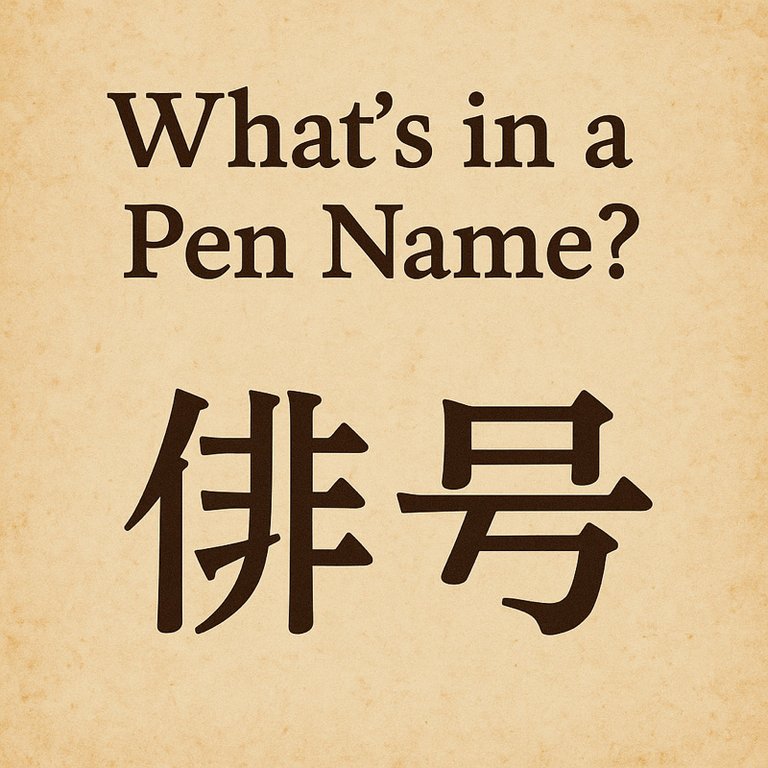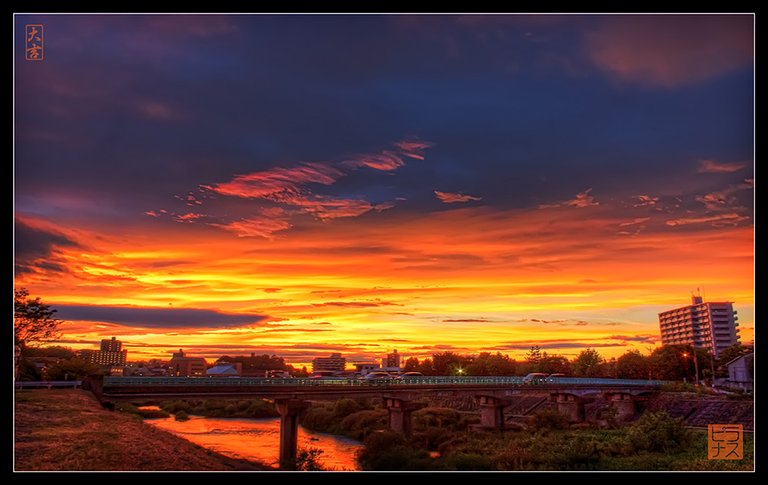What's in a Pen Name?

In the haiku world, poets traditionally choose pen names. That is, a nom de plume — in other words, a pseudonym. There are many reasons for doing so: to stand out with something more unique than an ordinary name, or to choose something that better reflects one’s philosophy or personal circumstances.
Most classic Japanese haikuists you know, you know by their pen names — not their birth names. Bashō’s real name was Kinsaku, later Munefusa (it was common to change names a few times during one’s life back in his day). He picked Bashō, which means “banana tree”, because his rustic hut, built by his students, had a banana tree planted next to it.
Issa, the pen name of Nobuyuki, means “one cup of tea”. I’ve never seen a reason given for this name, but it reflects his personality: warm and simple. Both Issa and Bashō used other pen names over their lives, but the ones we remember them by were their final ones.
One of my favorite poets, Santōka, used just a single pen name, chosen from a Chinese system of elemental divination. His real name was Shōichi. Santōka means “mountain fire”, though scholars often interpret it as Cremation-ground Fire — a reference, perhaps, to his lifelong trauma from witnessing his mother’s suicide.
I’ve long been searching for a pen name of my own. One of my favorite haiku translators and commentators, Robin D. Gill, uses the name Keigu (敬愚), which humorously means “Yours foolishly” — a pun on the standard closing 敬具 (keigu), meaning “Yours truly”. It’s the perfect pen name for him. In addition to haiku, he dives deeply into comedic senryū and the cruder bareku.[1]
Using the same Chinese elemental naming system that Santōka drew from, I plugged in my own birth year and got the name 天上火 (Tenjōka) — “Fire in the Heavens”.
Santōka didn’t use the name assigned to his birth year. That would have been 楊柳木 (Yōryūboku) — “Willow Tree Wood”, suggesting flexible, swaying strength. Humble, gentle, and poetic. He instead chose Santōka, for reasons of his own.
In terms of meaning, I prefer Yōryūboku. But in sound? Not so much. It’s okay in Japanese, but nearly unpronounceable for most English speakers unless they’ve heard it spoken aloud first. Even then, that ryū part would be very hard for them.
Tenjōka has the opposite problem: the meaning is a little too dramatic for a humble poet, but the sound rolls easily off the tongue. English speakers would probably read it correctly on first try, guessing that it is something like “ten-joe-kah”. And the meaning — “fire in the heavens” — does have a nice sound to it.
It reminds me of a photo I once took:

That day, a typhoon had just passed. The main rains had ended not long before sunset. It was still sprinkling, still gray, but I grabbed my camera and headed to an open field. I knew from experience: post-typhoon sunsets are often spectacular. I was gambling that the clouds would break just enough in time.
And they did. Not completely — but enough. The sky flared open briefly, and it was breathtaking.
I titled that photo The Fires of Heaven. It’s always been one of my favorite shots.
The phrase might evoke biblical images for some Western readers — but that wasn’t my intent. I was thinking of the title of a Wheel of Time book. Book five, I think. The Fires of Heaven. I don’t remember what happened in the book, but I’ve always liked the title. For me, it suggests those moments of radiant, otherworldly sky: twilight, sunset, sunrise. The red glow of possibility or of reflection.
That in mind, the Chinese horoscope showing me the name Tenjōka for my birthday is kind of serendipity — or as Bob Ross always put it, a “happy accident”. Jung might have had something to say about this synchronicity.
Still, Tenjōka suggests radiance, maybe even prominence. A fire in the sky is hard to ignore. And I don’t feel much of a connection to that. A haiku poet should be humble. Quiet. Not showy.
So I don’t know. I like the name. I also don’t.
But for now, I might try it out. I may sign some of my original haiku with it and see how it sits. Maybe it will grow into itself. Or maybe I’ll find something that fits better later.
-
Senryū are, more or less, haiku without a seasonal or nature focus, aiming instead for humor. As Blyth put it, they’re about human folly instead of nature. Bareku (“lewd verse”) are a subgenre of senryū, veering into what we might call toilet humor. ↩
❦
 |
David is an American teacher and translator lost in Japan, trying to capture the beauty of this country one photo at a time and searching for the perfect haiku. He blogs here and at laspina.org. Write him on Mastodon. |
I can add little,
but I am pseudonymous.
Do Hive handles count?
I suppose they do!
That is pretty cool. It seems a lot of actors and actresses use false names as well. It must be something with the arts in general!
I think for actors it's usually forced on them. The Acting Guild requires a unique name. That's why, for example, a young comic named Michael Douglas changed his name to Michael Keaton. If their real name sounds too foreign, they are also pressured to change to a more "American" name.
Ah, I didn't know that.